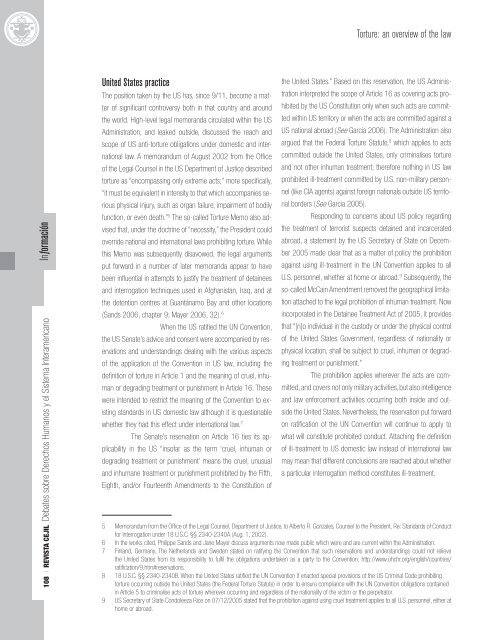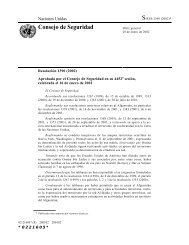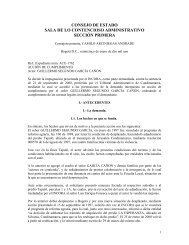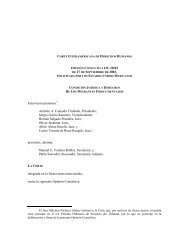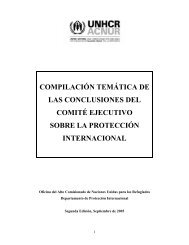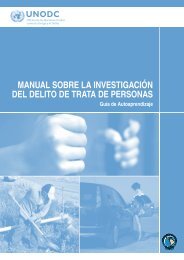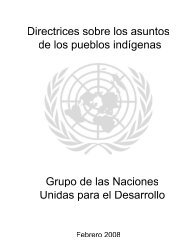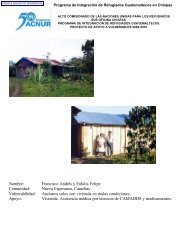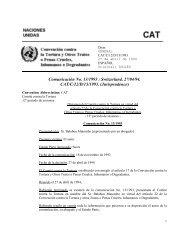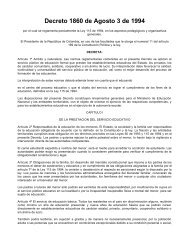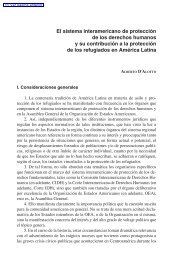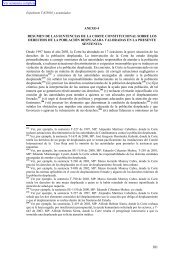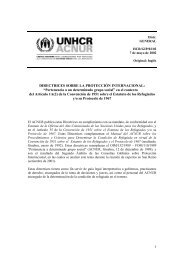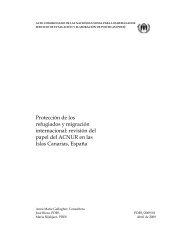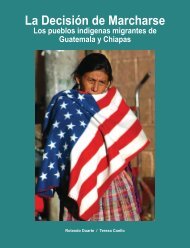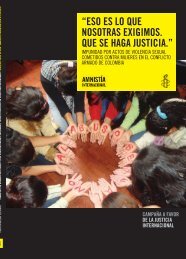Debates sobre los derechos humanos y el sistema ... - Acnur
Debates sobre los derechos humanos y el sistema ... - Acnur
Debates sobre los derechos humanos y el sistema ... - Acnur
Create successful ePaper yourself
Turn your PDF publications into a flip-book with our unique Google optimized e-Paper software.
108 | REVISTA CEJIL <strong>Debates</strong> <strong>sobre</strong> Derechos Humanos y <strong>el</strong> Sistema Interamericano Inƒormación<br />
United States practice<br />
The position taken by the US has, since 9/11, become a matter<br />
of signifi cant controversy both in that country and around<br />
the world. High-lev<strong>el</strong> legal memoranda circulated within the US<br />
Administration, and leaked outside, discussed the reach and<br />
scope of US anti-torture obligations under domestic and international<br />
law. A memorandum of August 2002 from the Offi ce<br />
of the Legal Couns<strong>el</strong> in the US Department of Justice described<br />
torture as “encompassing only extreme acts;” more specifi cally,<br />
“it must be equivalent in intensity to that which accompanies serious<br />
physical injury, such as organ failure, impairment of bodily<br />
function, or even death.” 5 The so-called Torture Memo also advised<br />
that, under the doctrine of “necessity,” the President could<br />
override national and international laws prohibiting torture. While<br />
this Memo was subsequently disavowed, the legal arguments<br />
put forward in a number of later memoranda appear to have<br />
been infl uential in attempts to justify the treatment of detainees<br />
and interrogation techniques used in Afghanistan, Iraq, and at<br />
the detention centres at Guantánamo Bay and other locations<br />
(Sands 2006, chapter 9; Mayer 2006, 32). 6<br />
When the US ratifi ed the UN Convention,<br />
the US Senate’s advice and consent were accompanied by reservations<br />
and understandings dealing with the various aspects<br />
of the application of the Convention in US law, including the<br />
defi nition of torture in Article 1 and the meaning of cru<strong>el</strong>, inhuman<br />
or degrading treatment or punishment in Article 16. These<br />
were intended to restrict the meaning of the Convention to existing<br />
standards in US domestic law although it is questionable<br />
whether they had this effect under international law. 7<br />
The Senate’s reservation on Article 16 ties its applicability<br />
in the US “insofar as the term ‘cru<strong>el</strong>, inhuman or<br />
degrading treatment or punishment’ means the cru<strong>el</strong>, unusual<br />
and inhumane treatment or punishment prohibited by the Fifth,<br />
Eighth, and/or Fourteenth Amendments to the Constitution of<br />
Torture: an overview of the law<br />
the United States.” Based on this reservation, the US Administration<br />
interpreted the scope of Article 16 as covering acts prohibited<br />
by the US Constitution only when such acts are committed<br />
within US territory or when the acts are committed against a<br />
US national abroad (See Garcia 2006). The Administration also<br />
argued that the Federal Torture Statute, 8 which applies to acts<br />
committed outside the United States, only criminalises torture<br />
and not other inhuman treatment; therefore nothing in US law<br />
prohibited ill-treatment committed by U.S. non-military personn<strong>el</strong><br />
(like CIA agents) against foreign nationals outside US territorial<br />
borders (See Garcia 2005).<br />
Responding to concerns about US policy regarding<br />
the treatment of terrorist suspects detained and incarcerated<br />
abroad, a statement by the US Secretary of State on December<br />
2005 made clear that as a matter of policy the prohibition<br />
against using ill-treatment in the UN Convention applies to all<br />
U.S. personn<strong>el</strong>, whether at home or abroad. 9 Subsequently, the<br />
so-called McCain Amendment removed the geographical limitation<br />
attached to the legal prohibition of inhuman treatment. Now<br />
incorporated in the Detainee Treatment Act of 2005, it provides<br />
that “[n]o individual in the custody or under the physical control<br />
of the United States Government, regardless of nationality or<br />
physical location, shall be subject to cru<strong>el</strong>, inhuman or degrading<br />
treatment or punishment.”<br />
The prohibition applies wherever the acts are committed,<br />
and covers not only military activities, but also int<strong>el</strong>ligence<br />
and law enforcement activities occurring both inside and outside<br />
the United States. Neverth<strong>el</strong>ess, the reservation put forward<br />
on ratifi cation of the UN Convention will continue to apply to<br />
what will constitute prohibited conduct. Attaching the defi nition<br />
of ill-treatment to US domestic law instead of international law<br />
may mean that different conclusions are reached about whether<br />
a particular interrogation method constitutes ill-treatment.<br />
5 Memorandum from the Offi ce of the Legal Couns<strong>el</strong>, Department of Justice, to Alberto R. Gonzales, Couns<strong>el</strong> to the President, Re: Standards of Conduct<br />
for Interrogation under 18 U.S.C. §§ 2340-2340A (Aug. 1, 2002).<br />
6 In the works cited, Philippe Sands and Jane Mayer discuss arguments now made public which were and are current within the Administration.<br />
7 Finland, Germany, The Netherlands and Sweden stated on ratifying the Convention that such reservations and understandings could not r<strong>el</strong>ieve<br />
the United States from its responsibility to fulfi l the obligations undertaken as a party to the Convention, http://www.ohchr.org/english/countries/<br />
ratifi cation/9.htm#reservations.<br />
8 18 U.S.C. §§ 2340-2340B. When the United States ratifi ed the UN Convention it enacted special provisions of the US Criminal Code prohibiting<br />
torture occurring outside the United States (the Federal Torture Statute) in order to ensure compliance with the UN Convention obligations contained<br />
in Article 5 to criminalise acts of torture wherever occurring and regardless of the nationality of the victim or the perpetrator.<br />
9 US Secretary of State Condoleeza Rice on 07/12/2005 stated that the prohibition against using cru<strong>el</strong> treatment applies to all U.S. personn<strong>el</strong>, either at<br />
home or abroad.


